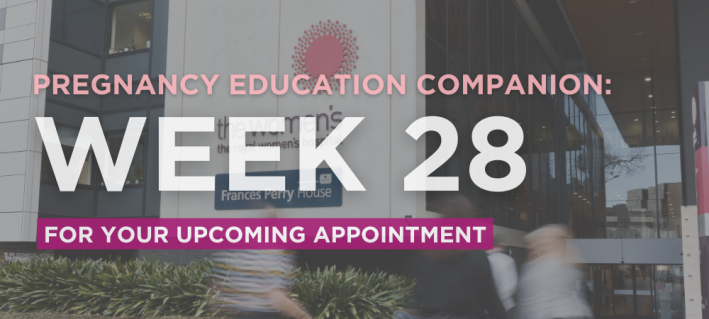
If you don't want to receive this information, please call (03) 8345 3272 or email patientexperience@thewomens.org.au
This week is about your 28 week appointment, and more.
By now, you will probably have had or be about to have your 28 week appointment.
From now until the birth of your baby, our information will come to you every four weeks and will be presented in a three-part format:
- Reminders and a recap of things that we have talked about in previous weeks
- Things affecting your pregnancy now
- Additional things to consider
Part 1: Reminders

Now is the time to consider having your respiratory syncytial virus (RSV) vaccination. RSV affects people of all ages, with babies and young children most often affected. Babies and older people are most at risk of serious illness. A single dose of the RSV vaccine is recommended between 28-36 weeks of your pregnancy, to help protect your baby. More information about RSV.

It’s recommended that you and the people around you don’t smoke during your pregnancy and after your baby is born.
If you’re having trouble quitting, look back at the information and links in Weeks 20-21 to help keep you motivated and supported.

If you haven’t already spoken with your workplace about your pregnancy and maternity leave, now is the time to do so. Look back at week 22, for information about your rights and entitlements.


Rest and exercise are so important - especially now that baby is growing much bigger. Back care, rest and gentle exercise will improve your stamina in labour and support a good recovery after the birth.
Look back at Week 22 for more information.

Relaxation is best practised on a regular basis. If you haven’t yet found a good form of relaxation that works for you, now’s the time to seek out some options. Then practice them daily if possible.
Week 22 explains why relaxation is important and includes suggestions on things you could try.

Congratulations if you have been doing your pelvic floor exercises regularly.
If not, see our fact sheet Pelvic floor exercises for tips on how to do them or look back at Week 22.

Hopefully, things are going well for you and your baby. However, if you have an urgent question, that cannot wait until your next appointment with our Clinic or your GP, then follow these guidelines:
- For general inquiries, call our Parkville switchboard on (03) 8345 2000. Please note we are unable to give medical advice over the phone.
- If you need urgent medical help ring 000.
- If you are worried about yourself or your baby or think you may be in labour, come into the Women’s Emergency Care Department, located on the lower Ground Floor, 20 Flemington Road, Parkville. Ring (03) 8345 3635 to speak to a midwife or doctor if you are experiencing any of the following:
- vaginal bleeding
- fever, chills, or a temperature of more than 37.8 degrees Celsius
- severe nausea and repeated vomiting
- persistent headaches that won’t go away
- blurred vision or spots before your eyes
- sharp pains in the abdomen (with or without bleeding)
- pain or burning when you pass urine
- irregular contractions at any time
- sudden swelling of your face, hands, ankles, or fingers
- persistent itchy skin
- exposure to rubella (German measles) or chickenpox
- your waters break or if you have a constant clear watery vaginal discharge
- you’ve had any trauma such as an assault, a car accident, or a serious fall
- your baby stops moving or you are concerned your baby is moving much less than normal.

Previously, we mentioned that it’s important for you to feel safe during your pregnancy. If you are in a relationship, at home or at work, where you are experiencing verbal, emotional, sexual, financial, spiritual and/or physical violence, please talk to a health professional. Violence and abuse can have an enormous impact on you, your pregnancy, your baby’s health and the wellbeing of other children.
For support and information talk to your midwife, doctor or other health professionals or ask to see a social worker.
If you are in immediate danger, telephone 000.
Other services that can assist include:
- Centre Against Sexual Assault (CASA)
(03) 9635 3610 (24 hours, 7 days a week) - Safe Steps Family Violence Response Centre
1800 015 188 (24 hours, 7 days a week) - inTouch Multicultural Centre Against Family Violence
1800 755 988 (10am–4pm, Monday to Friday) - Safe and Equal
Specialist family violence services that provide support to victim-survivors in Victoria
Part 2: Things affecting your pregnancy now

Most pregnant women will be tested for gestational diabetes at 26-28 weeks of pregnancy (except those women who already have diabetes). You will probably have already had this test.
If you have been diagnosed with gestational diabetes, you will be referred to our Nutrition and Dietetics department for education and advice. They are located on Level One, between our Imaging and Pathology departments (behind the main lifts).
This is a great time for all pregnant women to review their diet, nutrition, and weight gain to keep well during pregnancy.
You can refer back to the information in Weeks 20-21 or visit our webpages Food & Nutrition in Pregnancy and Weight and Pregnancy.

You had a blood test in early pregnancy to check your blood group and if you are Rh positive or negative. Most women (85 per cent) are Rh positive.
If you are Rh negative, you will be asked to have another blood test around 28 weeks and may be given an Anti-D injection. Your consent is required for this injection as outlined in last week’s information. You will have another blood test, and possibly an Anti-D injection, at 34 weeks.
Part 3: Additional things to consider


In preparation for your hospital stay, consider what is needed for you, your baby and perhaps what your partner needs.
Our fact sheet Things to bring to Hospital provides a comprehensive list and is available in many languages.

According to research, labouring women with continuous effective support in labour and birth are 50 per cent more likely to have a vaginal birth, have less use of medical pain relief and describe a more positive experience.
See also the Having Your Baby at the Women’s booklet (page 36).

- Choose your birth support team carefully. You may choose to have your partner, family member or friend. Some women choose to have a birth attendant or doula* for their support. Sometimes there may be restrictions on how many people may be with you in the birthing room.
- Look after your health and wellbeing during the pregnancy and in preparation for the labour.
- Consider practising relaxation or mindfulness techniques, like breathing exercises.
- Understand the process of birth.
- Understand the different things you can do to help your body during labour
* Doula – a person who you choose/pay to provide physical and emotional support to you during labour and birth. They may or may not be a health professional. They are not part of the hospital staff.

- Create and maintain a positive birth space: private, safe, and comfortable.
- Understand your partner or friend’s birth wishes.
- Understand that labour and birth is a normal, healthy process.
- Watch your partner/friend’s face and body for signals and encourage them to release tension.
- Remember to look after yourself - take breaks as needed and eat and drink as necessary.
- Encourage your partner or friend to eat & drink, as desired. The amount they wish to have will change during the labour.
- Massage them if requested.
- Encourage light activity and position changes
- Encourage deep, rhythmical breathing
- Have heat packs ready if wanted
- Organise the logistics, for example, know where the hospital bags are and where to arrive at the hospital. Make sure there is petrol in the car.

There may be many members of your health care team during your labour and birth, depending upon your and your baby’s needs at the time.
A midwife is a health professional qualified to care for you during your pregnancy, labour, birth and the first six weeks following your birth.
You may have met many midwives during your clinic visits. You may have one or more midwives care for you during the labour and birth. They can support your birthing plan and encourage many ways of working through your labour. They can also identify any concerns during your labour.
There are normally 1-2 midwives present at the birth of your baby.
Some of you may meet a medical doctor during your pregnancy. A doctor may be asked to assess you during the labour if any concerns develop. Doctors would be the one to perform a vacuum birth, a forceps birth, or a caesarean section birth.
An anaesthetist is a doctor who would perform an epidural, spinal or general anaesthetic (depending upon what is needed at the time) for your labour or if you are having a caesarean section birth.
A paediatrician is a doctor specifically responsible for the health of babies. They may be present for the birth of twins, babies known to have a specific medical problem or those who may have developed a concern during the labour.

Having a baby can be a fun time for shopping and buying things for baby. However, for some it can be a challenging time finding the right things to have.
Your baby requires only a few essentials: something to wear, somewhere to sleep and something to travel in. Before buying anything ask yourself - Do you or your baby really need it? Is it safe?
- Something to wear includes nappies, clothing, sheets and blanket, and muslin wraps.
- Somewhere to sleep may be a bassinet or cot.
- Something to travel in may be a pram, car seat or baby carrier.
We all want to buy the best and safest equipment and furniture for our baby, however it doesn’t need to be expensive. Buying or borrowing things that meet the Australian Standards is more important. Keep baby safe provides a guide to infant and nursery products.
When buying or being given anything that is second hand, things to check include:
- The item is complete, not broken or torn and preferably comes with instructions.
- It is not mouldy or dirty.
- If painted, it has not been painted with lead paint.
- If it is a car restraint, that it has not been involved in an accident.
- If it is a cot, you always purchase a new mattress. The risk of SIDS increases when using a mattress from another family.
- Baby clothes are barely worn or still come with new tags.
- When buying baby clothes, check that any zips, fasteners, or buttons are secure and there are no unravelling seams. Also look out for cords or drawstrings around the neck, as these could prove a choking hazard.
- Check that the item does not have a nightwear label saying: KEEP AWAY FROM FIRE (printed in red) or LOW FLAMMABILITY as these are a fire risk.
- Pre-used toys comply with safety requirements.
- Toys are suitable for the age you're buying for, especially if you're buying for a baby or toddler under three years old. If the box or instructions containing this information is missing, look for details on the manufacturer's website.
- Any toys with detachable small parts are secure and not a choking hazard.
- Any stuffed toys can be washed in hot water to get rid of germs before giving them to children.

Now is a great time for looking at any safety concerns/issues that may exist around the home.
Some of the key things to consider are related to your baby’s health, safe sleeping, selecting child car restraints and other baby furniture, pets, and general issues around the home. The following provides links that cover this information in detail.
- The Women’s fact sheets:
- Parent guide to the first week of life – explains how to identify if your baby is unwell
- Hot weather and babies
- The Cancer Council provides information on sun protection for babies and toddlers.
- Red Nose has fact sheets on safe sleeping, co-sleeping with baby, safe wrapping, and tummy time. Fact sheets on these topics and many more can be downloaded from their Resources and Factsheets webpage.
- VIC Roads provides up-to-date information on child restraints and car seats.
- It is becoming more common for parents to wear their baby on their body using a sling, sarong, or baby carrier. For the best advice and recommendations see Raising Children Network – Baby carriers, slings and backpacks: safety guide.
- The Royal Children’s Hospital (RCH) website provides information on a range of safety topics. A good place to start is Safety: Around the home.
- We Are Family provides advice about baby and pet safety, including preparing your pet for a new baby, safe handling of pets during pregnancy, and pet discipline around babies and children.
- Their key messages are to ensure your pet is well trained before your baby arrives home and to supervise or separate your child and pet - never leave them alone together.

Welcoming a new baby into the family can be a big change for everyone, especially other children. The age of that child can also have an impact on how they are able to adjust and express their feelings about the new family member.
- In preparation for the birth, remember that 7-8 months is a very long time for a child to wait for a sibling. When you tell your child about their new brother or sister can depend on their age. Ask your Maternal & Child Health nurse for advice with your pre-schooler.
Some tips include:
- During this pregnancy tell the sibling all about their birth and what you and your partner did for them as a baby. Making a little photo book or using their baby album can help. Let the older child know, that you will be doing all these things for the new baby too. If your family is also around, involve them in story telling as well.
- Use story books about new babies and becoming a big brother/sister. Your local library will have many of these to share.
- Introduce your older child to other babies or point them out when you are out and about. Many mothers of babies are more than happy to show you their baby.
- Get them involved in things you do to prepare for baby – shopping, setting up the room, helping to choose a name. Please remember that as the parent you need to decide who has the final choice about these things.
- If possible, organise some time spent with family or friends, such as lunch dates, sleep overs etc. This will be valuable once baby is born too.
- When the new baby comes home, there will be a transition period for all of you. Again, how your child reacts could be related to their age and position in the family.
Some tips include:
- For many families, the mother may have been the child’s focus before the birth. Do not be surprised if the child “ignores” you after the birth or demands more of your time than usual. This may be their way of saying ‘I don’t feel comfortable’ with this new dynamic. Allow them the time to adjust.
- Try and offer the child time alone with each parent.
- Praise them by telling them what a help they are when they do certain things and how lucky baby is to have a big brother/sister.
- Acknowledge the child feelings, such as frustration. By talking to them about how they feel this can minimize misbehaviour.
- Keep focus on what hasn’t changed, for example keep to pre-birth rituals and habits.
- Don’t pressure a child to “love” the new baby. The reality of having a baby in the house may take time.
- Whenever possible, if the older child is upset, allow them to express their feelings and be comforted by a parent or known family/friend.
For more information see Raising Children Network: New baby: preparing your other children.

At the Women’s, we acknowledge the diversity of women, men, transgender, and non-binary gender identities and that all people have a right to a safe, welcoming, and respectful environment that is inclusive of all families.
Building gender equality is an ongoing social expectation. Pregnancy is a great time to start/maintain equal and respectful relationships in the transition to parenthood. It can be a time to discuss and challenge the rigid gendered expectations of parenting. This can help address some of the issues relating to breakdown of relationships and an increase in violence against women. (Our Watch, 2018 Report).
Remember, the workload in your new family may not always be equally shared. At times one person may have a greater load, such as caring for the new baby, illness, increased demands at work. The important thing is how you support each other during these times.
It’s important to identify who else you can turn to for support when it is needed. Discuss with your partner or support circle what this support or help may include.
More information and advice can be found on:
We hope you have found this information helpful.
If you have any health concerns, please talk to one of your health care professionals – midwife, General Practitioner (GP), hospital doctor, etc.
There will be more to read and learn in four weeks. Stay safe and well.